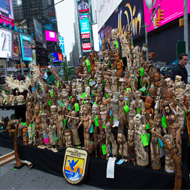
US Government raise awareness of illegal ivory trade
Over one ton of illegal ivory has been destroyed by the US Government before crowds in New York, sending out a clear message that the nation will not tolerate wildlife crime.
The event, which took place in Times Square, was organised by the U.S Fish and Wildlife Service (USFWS) and New York State's Department of Environmental Conservation (NYDEC). It was also supported by a host of other wildlife and conservation organisations.
John Calvelli from the Wildlife Conservation Society said: "Crushing ivory in Times Square - literally at the crossroads of the world - says in the clearest terms that the US is serious about closing its illegal ivory markets and stopping the demand.
"We applaud the Fish and Wildlife Service and DEC for their efforts to close this deadly trade that is currently decimating Africa's elephants at the rate of 96 each day".
Carter Roberts, president and CEO of World Wildlife Fund, added: "Today the United States sent a strong message that it will not tolerate wildlife crime.
"For Africa's vanishing elephants, these are the most desperate of times and more needs to be done. Just last month, China - another major consumer market for wildlife products announced it would end its ivory trade. The US must do the same urgently".
Thousands of supporters watched on as ivory tusks, statues, jewellery, trinkets and other decorative items were crushed by an industrial rock crusher.
It was the latest in a series of actions by the Obama administration designed to address both supply and demand that feeds international poaching and wildlife trafficking rings.
Much of the ivory destroyed was confiscated from an art and antiques dealer in Philadelphia, who was sentenced in 2014 to 30 months in prison and ordered to pay just under $160,000 in fines. Because the ivory was illegally traded, it could never be sold in the US market.
Image (C) Julie Larsen Maher



 The Greyhound Board of Great Britain has published new vaccination guidance, with all greyhounds registered from 1 January, 2027 required to have the L4 leptospirosis vaccination, rather than L2.
The Greyhound Board of Great Britain has published new vaccination guidance, with all greyhounds registered from 1 January, 2027 required to have the L4 leptospirosis vaccination, rather than L2.